|
||
-
Entry 10 - February 11 2014 - Memory Landscape # 1
" You move through unfamiliar streets in a way that you can only do once. "
( Iain Sinclair: Our Unknown Everywhere: 2013 )
In summer here , everything is surely caught in the water tower's ominous shadow. In winter, this futuristic temple creates a vortex of damp dereliction which prevents any movement beyond the village's outskirts. For two weeks in this complex terrain I carried Iain Sinclair's extraordinary pamphlet " Our Unknown Everywhere - Arthur Machen as Presence ".
I walk, I read - that's all. Afterwards, as I realise that another accidental drift has become a focussed, obsessive exploration, I try to find a place to stitch together the fragmentary impressions that ghost back into my head. Often this will be a jaded high street pub or soft-focus, suffocatingly warm hotel bar, these ' chambers', as Sinclair terms them, in which, 'the movement of the walk, that drinking in of sounds and impressions can unravel and take new forms'. Perhaps for me, some jagged hand-typed small town poetry, perhaps a spark to some desperate, unexpected but ultimately inspirational dialogue; just anything to prove I was "there". So this is not a review, just a note about carrying a book in a specific situation, about parallel walks and about recognising and engaging with what Sinclair identifies in Machen's studies as the, ' miraculous mundane '.
" Our Unknown Everywhere " is a complex, swirling homage to Sinclair's spectral mentor Arthur Machen; a return to the lost dark heart of his original Hackney walks, embracing , 40 years on, the need to counter the dangerous blandness that threatens to overwhelm. He urges himself, implores us to once again become, " creatively lost, questing against ennui and inertia and the dark clouds of mental disintegration". This I understand completely, almost religiously.
As the publishers of this exquisite, ongoing project explain, Sinclair regards Machen as, " a Figure in London writing, someone who has crossed his path time after time, who seems to be a constant shadowy ghost in the city streets. There are some uncanny correspondences in the backgrounds of the two men; both were born and brought up in Wales but moved moved permanently to London as young adults, worked in the many branches of the book trade and became urban wanderers absorbed and fascinated by the unfathomable labyrinth of the great metropolis. "
www.threeimpostors.co.uk
Here I stand in a version of my present; the warped miles of fencing, hypnotic, coated with a breath-taking almost neon lime-green moss. On the corner of Orwell Drive, a new red brick garage provides bloody camouflage for a scarlet Toyota Yaris in the dying afternoon. These are the signs you must respond to. Oddly, instinctively I thought of the lost pastoralism of George Orwell's novel, ' Coming Up For Air ' in relation to Sinclair's work; the trance-like passages in ' London Orbital ' and 'Edge of the Orison ' and equally in the this febrile essay:
a green path, a hollow way, a tunnel between thorns giving entrance to another reality,to a grove of shadows and stillness, where the muffled crump of traffic becomes a natural sound like running water.
For me, at the edge of this increasingly hemmed in recreation ground, the sludge is a familiar reality. Three gangling kids dance on top of the pill-box's lichen eyes as if to usher in dusk. Beyond them, through a break in the the tree-line, the lights of the show-home are dimmed and the developer's modern Medieval flags suddenly floodlit. Pristene,silken images of young families hand-in-hand are distorted by the breeze as it manipulates the silhouettes of skeletal branches. I cross into this zone of near-complete "executive" homes; passing through the immaculate shin-high fencing, the golf course green turf it protects, the mock dovecotes and frozen weather vanes - all tinted orange by Victorian gaslight. There are, I become aware, only driveways here, no pavements. There will, after all, be no reason to walk, experience or communicate here. The inscrutable, indestructible water tower will watch this private lull forever. Frightened for reasons I can't quite articulate in this piece, I turn back. In the gloom, I recognise the kids engaged in their final act of this drab night; an aggressive attempt to understand, to tear down the horror of the sagging, blackened cricket nets at the edge of the field. The skewed metallic frames hold firm but resemble the last surviving fishing nets of a war ravaged European harbour. This can't be and I begin to run towards what I remember was the main road, everything behind me evaporating.
"....the unknown world is about us everywhere, everywhere near to our feet, the thinnest veil separates us from it, the door in the wall or the next street communicates with it. "
( Arthur Machen: The London Adventure, or 'The Art of Wandering ': 1924 )
--------------------------- -
Entry 9 - January 20 2014 - Bonfires of The Lull
Above our dank November ghosts the council's " River of Lights " flickered within the shroud. Meant to connect village to town in winter communion, these lonely strings of bulbs, looped around the empty closing-time streets, served only to guide us back toward our silent disintegration.. I read these lights as another topographical vein to trace, a map for winter's deadening small town nights, their strange allure, their true terror. Before my eyes, the beams of the last boy-racer began to slice apart the portals of our possible escape; a moss slick ginnel behind the bookies, crumbling steps to the abandoned playground, the crucifix forms revealed by the peeling paint of doors to the lost bed-sits.
The walk was now against obliteration. I had to begin the decade again in a deeper silence. No camera or notebook, but always the fear. I would have to find new ways to collect the uneasy impressions, new methods to gather the fragments before everything crumbled.
I was aware of another ghost; the last customer in the hybrid pub /Chinese takeaway opposite. He was trapped in the sweet and sour-lager-sweat condensation. Behind him on the traditional fire-place, three golden plastic Bhuddas glinted. He watched me tear the bleached clown's face from the circus poster that had kept the derelict outdoor gear outlet from collapse. It was then that I suddenly tasted every element of the smoke which defines this memory; the pungent commingling of allotment oak and cane, the smouldering pallets and pop-art orange firework casings on rugby field mud, the caress of the coal fires from the last Victorian terrace to evade second-home gentrification.. The most terrifying small town silence I have ever known wrapped itself around me. Deep within it, as trapped as I was, a melody curled through the gauze of the night. Ahead of me, three Polish house-keeping girls, freed from a late-shift, sweetly linked arms, fatigue enhancing their pale, haunted beauty. It was their song, the melancholy of distance creating a reverie I wanted to last forever.
In the morning, as the last accusatory fingers of smoke dissipated and the rawness of late Autumn returned to sting our faces, the demolition of the outlet shop began. As the digger juddered into position shattering the glass from which the clown had once stared, I realised my immediate future was bound up in this comminution, in the death-dust of this dreary structure.It was clear to me that only Lane remained to protect the paltry roots I'd somehow put down here. With its lichen possessing memory of my every mistake and revelation, where the church's CCTV murkily traps the ghosts and thieves of every blurring season, it was the only place I had ever been able to pass through my anxieties. The whisper came from the frosted edge of the bank's private carpark," go to her now. "---------------------------
-
Entry 8 - January 5 2014 - Why I walk ?
" The local environment is the prism through which anyone's understanding of the cosmos is filtered. "
John R. Stilgoe.
from the film " Polis Is This: Charles Olson and the Persistence of Place "
www.ferriniproductions.com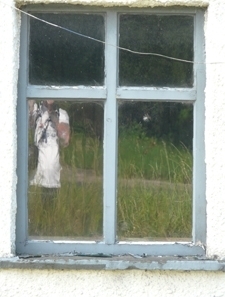
---------------------------
-
Entry 7 - December 13 2013 - ( Notes From ) The Lull #2
Each mile of that furious decade returned in echoes, making real communication beyond Lane an impossibility. Leaves and rust and the astonishing unseen border between granite and tarmac were my only concerns. Failure to understand Lane's every mood and contour meant certain collapse. I would walk relentlessly until Lane finally gathered me to her as a child. On that day, ice would penetrate the fissures within the last greenhouse pane outside No 4., the glass dropping in time with the melting icicles on the For Sale sign onto the debris that had supported it for so long; a sodden Builder Centre bag of sand, decaying bamboo screening, the odd, chicken like carcass of a crushed green plastic watering can, the bleeding pink tatters of a porno mag. On that day, the town itself would splinter.
Although I'd desperately wanted to, Jan had sensed from the start that I could never love her more than Lane, that the walk already possessed my heart. Somehow, during those leaden weeks, Jan had breached this realm with a sexual softness that opened my taut, stooped frame, challenging the belief system Lane had created for me. Her body on mine - a physical map obscuring my own. Just beneath the paler skin of her left shoulder lay the key to her walk, a beautiful intersection of veins - the lost net-work of hawthorn rich sheep droves that now lead to the lethal edges of the dual-carriageway. The pastoral dissected, the liminal everything. And yet still I fought this revelation, this collision. Her map offered motion and escape, mine with its staccato, unfinished sentences and smudged edgy sketches, spoke only of an inertia that deepened by the hour, threatening to become a permanent state , a fixed way of seeing. Without this suffocating safety net I'd woven for myself, it was possible I was nothing.
Our last summer dawn in the curtainless room she claimed as her own, my last chance to get out ? Jan stroked me awake, not to make love but to embrace the final stages of her walk and the rhythm of her disconnection. Dust motes spun, coating the downy hair of lower back like snowflakes as I walked through this second peeling sanctuary for the last time. A disused sunroom at the back of crumbling, failed house-share. A hallway of doorless wardrobes, a pissed tarnished basin and a carpet of fliers for a string of long gone take-aways.I felt the caress of the oneiric light Jan had discovered was trapped by the squalor. The crooked, slatted potting shelves that lined the room's wall were now the museum of her spectral presence. Parched and intricate elements of a sensuality I would never experience again. The last remaining fingerbones of geranium root, make-up brushes and stubs of myriad green pencil crayons, a tangle of hand-washed panties. These fading things - a fan of seven midnight metallic blue jackdaw feathers, shards of cobwebby terracotta plant pots, the broken spines of a stack of Angela Carter paperbacks -all suddenly snagged as leaves by the sinous shadows of a wire structure.
It would be her only gift to me; half rust red, half winter grey, precisely positioned at the heart of her memory and the room's devotion to dust. Scrambling over the skewed, moss slick fence at the edge of the first meadow, I tried to ask her about it.
" I slowly unwound it one summer," she said shrugging toward a ditch to our right. Partially hidden by emerald nettles and a ghostly white shredded fertiliser sack, was the rotting gate. Wasps rose from the dumped breeze blocks and cider cans and this day was already, imperceptibly beginning to fold in on all of us still stranded here.
A mid - December afternoon, long after we'd lost touch, I began to read the wire again as it lay sentinel, shadowless on this make-shift desk, scattered with my own fragments of hallucinatory evidence which might one day prove that both she and Lane were real entities. Ice-cold to the touch, I traced the wire's shapes; memories sparking, connections vivid. What Graham Sutherland termed the, " element of disquiet within landscape " was here, alive. I saw the shadow beneath the sun, the glow filtered by seven sycamores on the ridge above the tarn. Then the wire twists down to the banks of the brackish tarn to find the single swan's feather curled upon rain-bowed reeds. The room was in darkness. Through my exhaustion, I realised I'd crossed the terrain of our combined experience. Now, completely alone in exhileration, I began to follow the wire back to the moment of Jan's dissolve, in the complex pall of bonfire smoke that had lingered in the town for those two unreal nights, sensing that we had never parted at all.---------------------------
-
Entry 6 - November 24 2013 - ( Notes From ) The Lull
I heard afternoon's loss whisper through the chain-link boundary of our dreaming and looked up. I'd seen him around, seemingly in a permanent state of semi-drunkeness, too weary to bother hiding it, but weren't we all in those faltering summer days ?
If it still really existed, then he was of the village, of it's damp forgotten edges. Sometimes I'd follow him from a distance as he became the lanes, speeding four-wheel drives skimming the poetry of his battered coat, slicing the emerald bracken. With roll-up yellow fingers he turned our pages for us in the ghost libraries ; the empty mid afternoon buses, derelict picnic sites and grimey bars. For a year I'd watched the cover of the book he was then carrying seep luminous red into everything I knew here , a curling copy of Seamus Heaney's " Electric Light ". One phrase had obsessed me for years. I wanted to live through it and somehow transform my fear, " summer's language ". Never came close, but he did. I realised it wasn't envy I felt, but a great sense of love for his freedom. He was slumped three tables away whilst I was wired to mine and yet we still shared; asphalt grey stubble, fraying cuffs and the smell of this place - the stale lager and leaf mold - our parallel, desperate inspirations.
During the crumbling weeks that drew me towards this blurred encounter, I'd convinced myself that the green-house panes, propped for a decade against the building site rubble outside No. 4 actually held my mental health. They stored my seasonal shifts, wrapping them around the shimmering trunk of the reflected birch above the opposite unregarded verge. I could read the kaleidoscopic decay here. Through each hairline crack, each hanging shard, through each frozen web and parched wasp I saw that the demons were beginning to return. All I could do was begin the decade's walk again, pressing myself deeper into it's texture until I was invisible, until I was safe.
September had stunned the strangely unsurfaced side-streets into an eerie silence. Here I tried to disguise my new uncertainty. Each footstep kicked up new signs from the grey dust. No choice but to follow the grubby beauty again, my serotinal nowhereness trapped by diagonal shadows within a row of doorless council garages. As I passed, my own shadow shattered the pattern, and I swear my own skeleton was revealed. Dust was now mimicking my every movement. On Princess Avenue, my reflection is a mask upon a stratus cloud fleetingly caught in the undulating creosote sheen of the second telegraph pole. Unwittingly, I have fallen back in to the rituals of hyper-awareness and I'm terrified of the knowledge they will offer. Must edge towards sanctuary, to one of the most beautiful places in my shrinking world. With abacus clicking in my head, I enter the intoxicating emptiness of the social club's beergarden as the small town's magic hour begins to envelope our histories, dissolve our maps. Just order a drink, knowing that leaving can only be a dream.
I just count and lose count. It became the only way to confirm identity amid the rare dust and the rain which plays as a film here. Every detail of the dead days began to matter more, to speak more clearly of both regret and possibility. I believed my secret role was to surely interpret this dialogue, but only my shadow agreed. So I sit at this skewed table with its twelve sun-bleached slats, as brittle as sheep bones. On a thousand flecks of peeling khaki paint rests the unfinished daisy chain; eleven flower heads waiting to be linked. Four knots in the slat my drink balances on stare back as blackened eyes. A love scar reads, " K 4 T ". Such gorgeous, devastatingly sad traces of our lives will mesmerise me forever. A fruit-machine spills in the club house and jackdaws ruthlessly defend chimney pots above the rusting satellite dish, everything suddenly in delicate relief , a complex mesh drawn in pen and ink on the darkening sky.
This is how the night can unfurl here. The light above the Millenium garden opposite stutters into life. You drink on until it's amber glow paints the forgotten wrought iron gate before the club steps, now tied back purely by nature; the ivy and ferns of fevered dreams. This is the realm that's claimed you. From my hazy security, I saw myself back beneath that light, beneath the clock tower that cruel January evening. Both a wake and a walk would end there, my sorrow frosted, tinted orange, glimpsed only by a mother and daughter skipping through the chill.
" I thought that was a statue, mummy. "
From the churchyard we shuffled along the main road past the now invisible cricket ground, the snow so pure and our fears unspoken. A flimsy chalkboard announces the funeral tea for........Ghosted by the ice is his name already lost ? Inside the pavillion, the windows are steamed up. A young woman draws a ragged heart for him. Jukebox lights illuminate, " r. i. p ". To attempt to absorb the day's pain, I clung to colour; ruby red petals falling from the tattooed, arthritic fingers of the last to leave his respects. Exposed and punished by morning's aggressive decline, he turns to face the squall, one golden thread fraying from his leather jacket's chapter patch catches the fading light. From under dripping conifers, two grave-diggers in hi-viz yellow observe our shambolic procession, their cigarette plumes curling metallic blue into the white-out. The hiss of each snowflake's disintegration returned in a dream that night.
Once, those three week long hang-overs delivered clarity, brought magnificent visions. That morning, they stang like the hail pelting the chapel windows. Seventy three of us with hair-of-the-dog coated tongues singing seventy three silent, disparate songs of survival. Inadequate coats, trembling hands defining us as noon collapsed. A lone dog-walker just below the ridge's treeline, freer than us all. I wanted to drink hard but had to turn, confused tears to hide in the ghostly movement of the town.
" Keep the ruins on your left, mate. "
The walk back: new territory, unfamiliar emotions. I pause for breath at the edge of an unfinished cul-de-sac, lost in innocent silence. Family cars have carved a stark, spiral tattoo into the snow. By the time I reach the newsagents opposite the station, the order of service has bled it's autumn leaves into my pocket, into my sodden memory. The tepid silver four-pack suddenly reflects the changing pedestrian crossing lights. I reach the train that will return me to the endless small town night.
Eleven stifling minutes in the empty carriage and the ordinary is once again obliterated. An arc-light above the scrapyard softens the sleet before familiar landscape is lost to the night; those old goalposts by the boatyard, the death threat graffiti on the derelict cowsheds. Pitch black, but I know the barb-wire wound woodland watches the sweat form on my brow, reads the notes I began to scrawl on a tattered copy of " Metro", for what would become this accidental reverie:.........faces of lost friends flickering beyond smeared glass....jackdaws follow the train - impossible; but i see their blue eyes glinting......
I reach the clocktower. The sodden paper is snagged on the pinecone I'd dared to gather graveside. I began to crumble its scales between my numb fingers, the fragments falling into the slush - tab-ends, paw prints and my prayer. By morning, the winter had vanished. I passed the clock tower, that hallucinatory place of release, on my way to work. Slithers of pine remained at the intersection of four uneven paving slabs. Despite the poor light, the moss that lined these crevices glimmered in the form of a crucifix. It is there today.
To the screech of the 599's air-brakes, he comes round. Children scream as they grasp for sycamore branchess from it's open top. Blood red and gold, the language of leaves spins and falls on us both. Then he speaks from deep within the moment,
" Are you ready for the Lull ? "
" We live it already," my shadow replied.---------------------------
-
Entry 5 - September - 2013 : Accidental Drift
Click here to download the catalogue from the exhibition From The Lane (pdf)
---------------------------
-
Entry 4 - June 4 2013 - Sanctuary Sounds
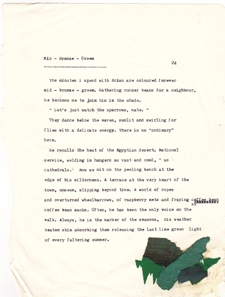
from: The Journal for The Faltering Summer
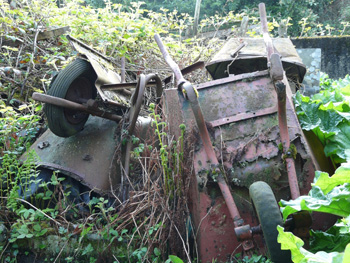
wheelbarrows in Brian's garden
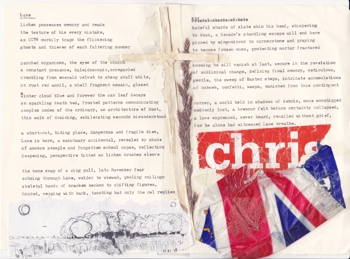
text/collage by Julian Hyde, soundscape by Alasdair Maclean
---------------------------
-
Entry 3 - May 14 2013 - For John Clare's ghost
It was virtually impossible for me to truly leave Lane. When i did , the shadows remained, chasing me from euphoria to terror and back. As the winter train halted on Essex heathland, I sensed his presence in the frozen bramble bank below the skeletal trees. As the carriage lights flickered he whispered, " I heard the voices but never looked back to see where they came from. "
Essex, winter train---------------------------
-
Entry 2 - 13 April 2013 - The Key
" Frequently I refuse to keep notes or other records of walks undertaken and as a result the memories of these fade and ultimately pass down into the land, and are forgotten.
At some level I think this is as it should be. "
Nick Papadimitriou: interview in Granta Magazine 22/5/2012
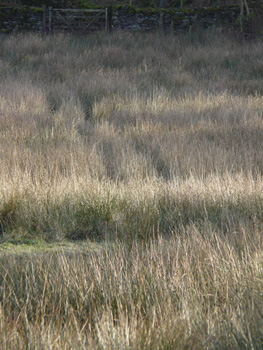
Winter Meadow, Windermere - 2012---------------------------
-
Entry 1 - 5 April 2013
Dust Walk # 1
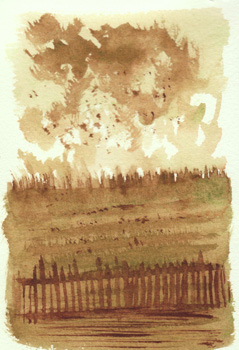
Burning Field
The lane became everything; this short-cut to work, this unseen realm between main road and church became the blank pages of the walks final phase. Echoes trapped in the lane spoke to me of an untold small town narrative and I had to find a way to respond, to begin to connect the spiderswebs and lost plimsoles, a fragment of a storm torn Christian Aid banner to a can of Kronenbourg crushed by the decade into the very texture of the lane. As dusk curled through the school railings, absolutely everything seemed alive, the material and natural in co-dependence and the intensity was overwhelming and I would think of Kerouac:
" everytime i see a leaf fall, i always say goodbye. "
Notebooks began to split, pierced by crash-site shards, lichen-painted twigs and my own jagged, fragmentary impressions
of the damp margins. I repaired them with found cardboard and Sellotape; accidental bindings formed from extracts from the few paperbacks
I'd lugged in failure from small town to small town to here. In the ghost-libraries that are empty buses, freezing pubs and unregarded woodland,
I reread John Fowles' " The Tree ", Derek Jarman's " Modern Nature ", George Orwell's " Coming Up for Air " and the nature prose of Gerard Manley
Hopkins. One of his journal entries in particular, offered me hope as the darkness of the fifth year of the walk began to take hold:
" I have now found the law of the oak leaves. " ( July 19th 1866 )
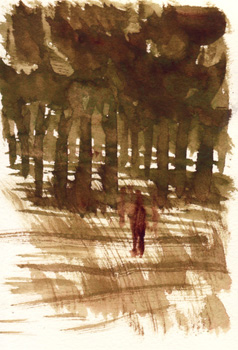
Figures in wood
I was sustained too during that time by letters and sketches by my friend and mentor Alasdair Maclean. These ghostly communiques from the Hackney Marshes
encouraged me to find my own language with which to articulate the walk, to connect the images, debris and presences I was encountering. I had to move beyond
mere survival. Without Alasdair's work that vital step would have been impossible.
For twenty years through poetry, paint and music he has been exploring the hallucinatory textures, the eeriness of the forgotten suburbs; those shadows at the edge
of the new estate, the skeletal treeline beyond. The origins of his vision can be glimpsed in the early poem, " Masquerade ":
" A car sighed through the far-off A road
and with that gentlest of noises
the pattern fell apart
I swear the suburbs
were gathering us in like a parent
but we clutched our proof
through swaying heads of corn
the reiteration of our nowhereness "
More of Alasdair's work can be viewed at http://alasdairmaclean.tumblr.com
With such haunting inspiration to engage with, I managed to break from the fearful habit of hiding from the kids , in swathes of bracken with cornershop vodka for protection.
I began to type what would eventually become a trilogy of books of days; " the archeology of sadness ", "the ecology of memory " and the " journal for the faltering summer ".
These are my collages for the stranded.---------------------------